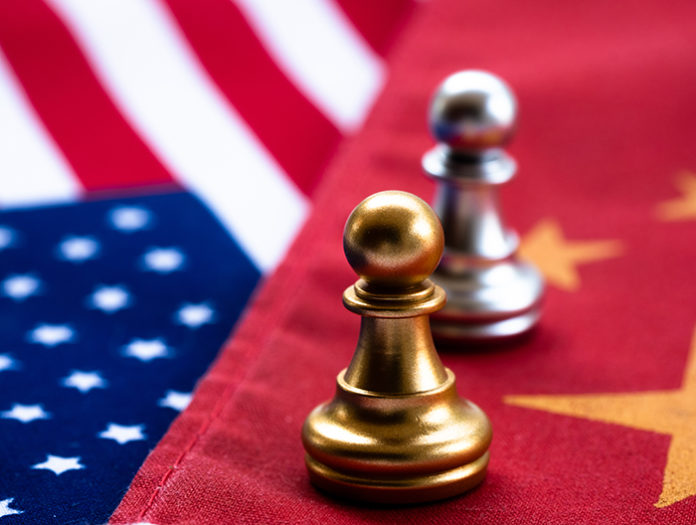
Guest Editorial by Paul Rosenzweig
It is increasingly clear that some Big Tech companies may be caught in the collision course between two countries central to their operations and growth–America and China.
The growing geopolitical divide between the United States and China over Taiwan may force multinational companies and organizations to make challenging decisions, including where to invest and where to operate.
Speaker Pelosi’s recent visit to Taiwan, followed by another Congressional delegation and, now, a trade delegation from Indiana, have heightened geopolitical tensions and only served to underscore the major dissonance between Chinese and U.S. political and business interests.
(Amid high tension with China after the visit of US House Speaker Nancy Pelosi to the self-governed island, another high-level US delegation has now arrived in Taiwan in an effort to further boost cooperation between Washington and Taipei. WION in a conversation with VOA correspondent Bill Gallo from Seoul, South Korea, bringing us more on the story. Courtesy of WION and YouTube. Posted on Aug 22, 2022.)
Already, we’ve seen major Chinese companies choosing sides, distancing themselves from both the U.S. and Taiwan.
American companies will soon be forced to confront the same dilemma as tensions continue to grow.
Perhaps nowhere have the effects of this tension been felt more than in the U.S. technology industry.
President Biden’s recent signature on the CHIPS and Science Act is a clear indication that the United States intends to compete directly with China in the technology space. CHIPS, for example, includes provisions that limit investments in China’s chip manufacturers.
Semiconductor and technology companies accepting federal subsidies under the CHIPS and Science Act are not allowed to engage in any “significant transaction” in China or any other foreign country of concern for a period of 10 years—effectively forcing these technology companies to choose a side.
(PIMCO Managing Director Head of Public Policy Libby Cantrill joins Yahoo Finance Live to weigh in on the signage of the CHIPS and Science Act into law, Speaker Pelosi’s trip to Taiwan, the Inflation Reduction Act, and more. Courtesy of Yahoo Finance and YouTube. Posted on Aug 9, 2022.)
We don’t know if CHIPS will be a model for further limitations on cross-border technological trade. But over the next several years, American protectionist instincts may only continue to grow, as tensions between both countries increase and they invest in their own domestic technology production.
The largest tech companies, like Microsoft, Apple, and Amazon, will be caught in the middle. They have strong ties to, and sophisticated manufacturing and service facilities in, both the United States and China.
For example, despite announcing that it would remove its retail operations from China in 2019, Amazon has increased its cloud computing presence in the country, building a cluster of data centers and bolstering its cloud services offerings in recent years.
Meanwhile, other companies (including Facebook, IBM, Microsoft, and Google) have 10% of their collective AI research labs housed in China, and their investments in the technology increase every year.
(Microsoft operates one of the largest cloud computing infrastructures in the world, serving over one billion customers and twenty million organizations worldwide. Learn from our experts, how our focus on scale, security, innovation, and sustainability enable us to build a trusted cloud platform for our customers. Courtesy of Microsoft Cloud and YouTube. Posted on Feb 19, 2020.)
Likewise, Microsoft has increased its market presence in China and its connection with the Chinese government over the past decade. The company announced a further expansion into China last year with five new data centers and plans to build four more in the coming years.
Microsoft’s investment in Chinese research centers has also grown, as the company’s Beijing-based Research Asia Lab has become the largest Microsoft R&D center outside of the United States. The company’s deep ties to the Chinese government, both as a business partner and a political partner, have continued to increase in recent years.
With such large investments in both China and the United States, big technology companies face substantial risks to their business assets and allegiances.
As FBI Director Christopher Wray recently noted, “Just as in Russia, Western investments built over years [in China] could become hostages, capital stranded, supply chains and relationships disrupted. . . . Companies [may be] caught between sanctions and Chinese law forbidding compliance with those sanctions… The Chinese government poses an even more serious threat to Western businesses than even many sophisticated business people realize.”
(“No country presents a broader, more severe threat to our ideas, our innovation, our economic security than China,” said FBI Director Christopher Wray to Scott Pelley in an interview on 60 Minutes. Courtesy of 60 Minutes and YouTube. Posted on Apr 22, 2022.)
Economic competition is nothing new in history.
What is new is the degree to which multinational companies, with global ties, are becoming pawns in Great Nation competition.
The conflict in Ukraine created significant pressures on foreign companies to abandon Russia. The future may hold some of the same pressures for Chinese-based enterprises.
Companies, and technology companies in particular, with deep ties to both the United States and Chinese governments, must understand the risks they face.
As the United States and China relations become more tenuous, big tech may be forced to choose a side.
(Learn More. The Great Power competition is back, threatening to divide the world into U.S. and Chinese spheres of influence just as humanity needs to come together to fight common enemies — global warming, threats to public health, cybercrime. Can Middle Powers and Rising Powers step up and lead? How will Europe act? Ian Bremmer, Founder and President, Eurasia Group and GZERO Media moderates a panel with Tony Blair, Former Prime Minister of the United Kingdom; Executive Chairman of the Tony Blair Institute for Global Change, Subrahmanyam Jaishankar, Minister of External Affairs, India and Hillary Rodham Clinton, Former U.S. Secretary of State. Courtesy of Bloomberg New Economy and YouTube. Posted on Nov 19, 2021.)
About the Author
Paul Rosenzweig is the founder of homeland security consulting company Red Branch Consulting and senior adviser to The Chertoff Group. Rosenzweig formerly served as deputy assistant secretary for policy in the Department of Homeland Security.

Mr. Rosenzweig is a Professorial Lecturer in Law at George Washington University, and a Senior Fellow in the Tech, Law & Security Program at the American University, Washington College of Law.
He serves as an advisor to and former member of the American Bar Association Standing Committee on Law and National Security, and a Contributing Editor of the Lawfare blog.
He is a member of the ABA Cybersecurity Legal Task Force and of the United States Court of Appeals for the District of Columbia Circuit Advisory Committee on Admissions and Grievances.
He serves, as well, as a Hearing Committee Member of the District of Columbia Board of Professional Responsibility. In 2011 he was a Carnegie Fellow in National Security Journalism at the Medill School of Journalism, Northwestern University.
Learn More…
(Hear from former U.S. Ambassador to China, J. Stapleton Roy; Professor Emeritus of China Studies at Johns Hopkins University, Dr. David M. Lampton; and Dr. Paul G. Clifford, Nonresident Senior Fellow at the Harvard Kennedy School and author of The China Paradox- At the Front Line of Economic Transformation. The panel will be moderated by former U.S. Ambassador to Nepal and President of the U.S.-China Education Trust, Julia Chang Bloch. This event was the Dame Jillian Sackler Symposium on U.S.-China Relations. Courtesy of Foreign Policy Association and YouTube. Posted on Jun 1, 2022.)
AST strives to meet a 3 STAR trustworthiness rating, based on the following criteria:
- Provides named sources
- Reported by more than one notable outlet
- Includes supporting video, direct statements, or photos

















